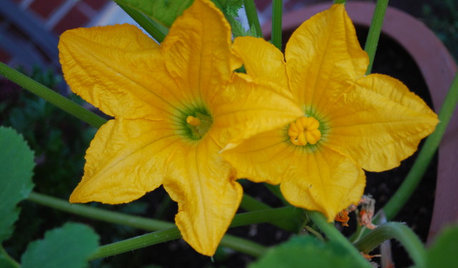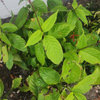What vege's are NOT suseptible to Root-Know Nematodes?
Does anyone have a list or could just throw out some idea's for plants not susceptible to root know nematodes.
Thanks...
Comments (15)
saldut
14 years agoHi- most every root-veggie is a target, at least that is my experience.... but if you can put a lot of compost and organic stuff in the beds the nematodes don't like it... also maybe have raised beds , where the dirt doesn't touch the ground, if you have a small veggie patch, and fill it with potting mix... also when raised, there is less other crawley bugs and fewer snails, etc. Years ago, I made a bed by putting down visquine and then filling it with potting mix, I put boards and made it 4 by 8 and then punched a few small holes in the visquine for drainage, and it worked very well for a few years... the nematodes attack lots of other plants here, roses and ornamentals, etc. the earth here is alive and doesn't freeze like up north...........sally
johnjsr
14 years agoHere's a list of veggies that are resistant to RKN. Mostly tomatoes. I planted french marigolds in one of my beds before I planted my fall garden. Looks good so far. It's a variety called Golden Guardian from Park seeds.
Vegetable Varieties Resistant to Root-Knot Nematodes
--------------------------------------------------------------------------------
Sweetpotato Cordner, Georgia Red (P), Heartogold (SPJ), Hernandez, Jasper (S), Jewel (S), Nugget, Red Jewel (J), Resisto, Southern Delite
Southernpea California Blackeye #5 , Colossus 80 , Pinkeye Purple Hull, Magnolia Blackeye, Mississippi Pinkeye, Mississippi Purple , Mississippi Shipper , Mississippi Silver, Zipper Cream
Beans (lima) Nemagreen
Bean (snap) Alabama No. 1 (pole)
English pea Wando
Pimento pepper Mississippi Nemaheart
Bell Pepper Carolina Wonder, Charleston BelleTomato Early Early Girl Bush VFFNT,
Jetsetter VFFNTATomato Mid Abraham Lincoln Improved VFN
Bella Rosa VFFNA,
Big Beef VFFNTA
Beefeater VFN,
Beafsteak Super VFN,
Better Boy VFN,
Burpee Supersteak VFN ,
Cabernet VFFNTA,
Cavalier VFNTA,
Celebrity VFFNTA First Prize VFFNT
Goliath VFFNT
Heartland VFN
Hastings Red Chief,
Keepsake VFFNTA
Jack Pot,
Roma II,
Monte Carlo,
Park's Whopper Improved VFNT
Royesta FFNT
Terrific VFN,
Tiffany VFNT
Tomande VFFNT
Ultra Boy VFN,
President, Quick Pick, Red Express,
Royal Flush,Sunripe,
Viva Italia
Lemon Boy VFN
Enchantment VFN
Small Fruit Patio Prize,
Miracle Sweet VFNT
Sweet Million FNT,
Sweet Cluster VFNT
Sweet Chelsea VFNT
Sweet Quartz VFNT
Small Fry VFNRelated Professionals
Erie Landscape Architects & Landscape Designers · Seabrook Landscape Architects & Landscape Designers · Camp Verde Landscape Contractors · Duarte Landscape Contractors · Fort Worth Landscape Contractors · Indio Landscape Contractors · New Baltimore Landscape Contractors · Plantation Landscape Contractors · Wheat Ridge Landscape Contractors · Aberdeen Decks, Patios & Outdoor Enclosures · Champaign Decks, Patios & Outdoor Enclosures · Kannapolis Siding & Exteriors · Levittown Siding & Exteriors · Westminster Siding & Exteriors · Iowa City Siding & Exteriorsmichaelc0
14 years agoThe "N" in the letters behind the tomato name designates nematode resistance. The gene responsible for the nematode resistance is only effective with cooler soil temperatures. As soil temperatures rise, the resistance is reduced. When soil temperature reaches 89 degrees (and above), the resistance is lost and the roots become susceptive to nematode damage.
Here is a link that might be useful: Mi Gene chart for tomato
carolb_w_fl_coastal_9b
14 years agoHere are some things I've grown/am growing that seem to defy those pesky RKnematodes:
Florence fennel
Packman broccoli
Rattlesnake pole beans
Aji dulce peppers
Garlic chives
Flat leaf parsleys
Egyptian onions
pineapples
several varieties of tomatoes - indeterminates seem to do best for me.Definitely look for the 'N' in hybrids.Black plum amazed me by showing NO damage when plants were pulled @ the end of a season
Chocolate Beauty peppers, Sweet Banana, Corno di Toro
'Perennial' arugula (sylvetta)
Chinese mustards - Tah Tsai, Mustard Spinach & 'baby' bok choy
many lettuces - I prefer loose leaf - Pinetree's blend & Cos are my faves
Lacinato kale (a.k.a. 'dinosaur')
Some hybrid cucumbers do well also, tho every year is different for me.IMPE, lots of compost & organic matter DO indeed help - & I add cornmeal & molasses as well, since they're supposed to promote beneficial microbes that combat soil pests.& I mulch heavily w/ spoiled hay as well.
My peppers & salad greens are always in pots(except arugula), since they tend to develop some sort of root rot(fusarium?) in the ground.
I also prefer starting most of my veggies from seed - they seem to survive much better than hothouse-grown transplants from the stores.
HTH - check the Soil & Compost forum for more good info on promoting healthy soil.
vaodiva
14 years agoAs Sally said, they don't like heavy organic matter. They're not in potting mix so you might consider growing your upright veggies in pots. Unfortunately, the french marigolds are only effective when tilled into the soil.
michaelc0
14 years agoPlants that are "Resistant" to RKN...
- Broccoli
- Brussel Sprouts
- Mustard
- chives
- garlic
- leek
- ground cherry
- rutabaga
- strawberryPlants that are "tolerant" to RKN...
- Artichokes (Globe & Jerusalem)
- asparagus
- sweet corn (Silver Queen does well for me)
- horse radish
- SOME lima beans
- onion
- rhubarbCowpeas that "Inhibit" RKN...
- Tennessee Brown
- Missippi Silver
- California Blackeye #5
- Iron & ClayCowpeas that have HIGH POPULATIONS of RKN...
- whippoorwill
- Pinkeye Purplehull (very bad nematodes for me)
- Texas PurplehullFruituislam1
11 years agoHI , MICHAEL DO YOU KNOW OF ANY MELON CULTIVARS OR SWEET PEPPER VARIETIES THAT DO FINE WITH THESE RKN? THANKS
L_in_FL
11 years agoIn response to a comment Sally made about raised beds - they don't protect against RKN for long, unless they have a solid bottom so there is NO soil contact. If they have an open bottom or even drainage holes that provide a pathway, the RKN will move right up into them.
I built new raised beds in March. The beds have an open bottom, but I put down a thick layer of newspaper to inhibit the underlying grass and weeds. I filled them with a mix of bagged soils and compost which should have been free of RKN. When I pulled my okra last month, about half the plants in the bed showed significant RKN damage. (This might explain why late-season production slowed down so much.) So, I'll focus on RKN-resistant crops this winter, and figure out some way to deter the nematodes during next spring and summer.
ocalagirls
11 years agoI try to grow as many resistant varieties as I can, but I've had better luck focusing on the soil and making it healthier. Better soil, fewer nematodes. So like others have said, increase the organic matter. You may never get rid of them but you can get them under control. There are some varities that I love but they get too damaged in my soil so I grow those in pots.
jane__ny
11 years agoIf I'm understanding this right, potted plants shouldn't sit on the ground?? I have a bunch of plants sitting outside under the trees. I also have a few orchids sitting on the ground.
Jane
subtrop
11 years agoI did have serious rt nematode damage for the last 2 years. I did a lot of research, added a lot of soil and peat moss and compost to a new veggie patch, but that wasn't really successful.Did soil solarization, not happy with the results. Planted french marigolds, had them tilled in, no results. Later I found out they don't help against root knot, but against sting nematodes. Great! So more research was done and I found some university articles about the covercrop Crotalaria juncea L. This is being used commercially with nematode issues. So this summer I had and still have this plant growing. One veggie patch got tilled in with the plant leaves so far and the tomatoes I sadly had to pull (yellow leaf curl virus due to ficus white fly) showed no damage to the roots. All but one plant on the far corner had some little galls. And the plants did grow much better than in spring.
Back to the topic: I grow Amaranthus dubius without having nematode issues. Broccoli did work fine as well.rtilebeinsr
8 years agoI also have done much research and spoke with people in the area with degrees in agriculture. they say in our area in central west florida coast, green house is the only thing to do. Soil is horrible, also infested with nematodes. From exsperience it is very hard to grow any veg. that is a root plant. which is the majority.
garden_gal_fl (z10)
8 years agoEven with dumping tons of organic material the RKN will still be a problem if their favorite types of crops are grown in the same spots in warm weather. I have had some luck with rotating cruciferous vegetables like collards and broccoli after/ before planting peppers, peas, cukes, and squash which otherwise might be heavily affected. For tomatoes and okra I start with new soil in pots in the fall and use it all season (Sept- May) for the tomatoes then use it for yardlong beans and/ or luffa over the summer.
Michael AKA Leekle2ManE
8 years agolast modified: 8 years agoA tip I picked up from my Gardening Australia show this past year (Apparently one of the hosts also fights RKN): Plant Tagetes Marigolds in the area where you plan to plant your veggies. Before time to plant, cut down all the marigolds and put them in the soil. When decomposing, Tagetes lets off a gas or enzyme that drives RKN away the area. I tried it this past summer/fall in a spot where I have tried to grow tomtoes but lost them to RKN. In fall I dug in the marigolds and replaced them with my tomatoes. I haven't gotten much fruit, but I blame that on the area getting too much shade this year and, of course, the warm nights. But the plants themselves are still doing just fine. And I have Marigold reseeds coming up, so when time comes, I will be able to dig these into the soil too.
(Edit: Which after reading through this in full, others have mentioned.)










bamboo_rabbit